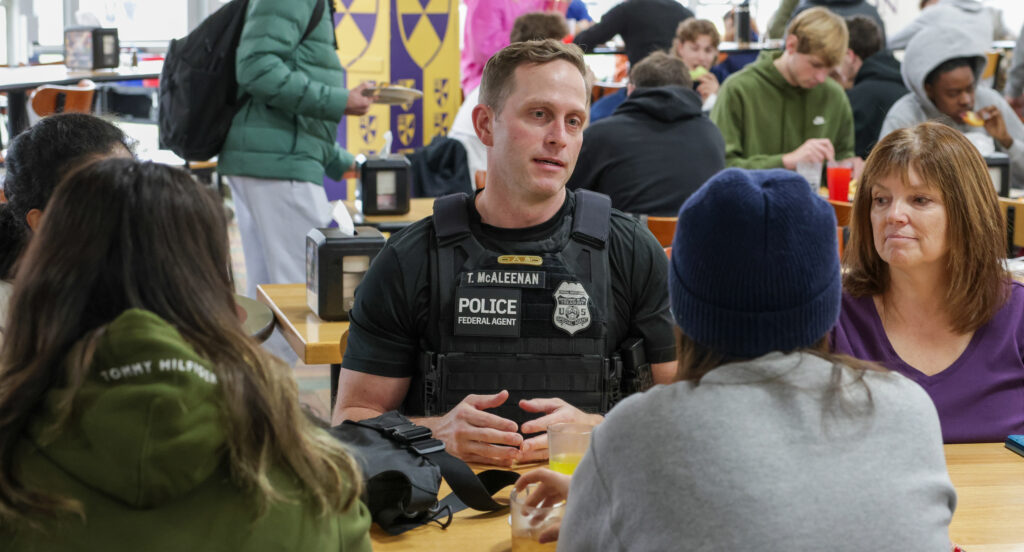Using big data to fight crime
Related Programs
Related Posts
Connect With Us
April 7, 2025
In 2012, 50,000 bitcoin, a measurable percentage of the world supply at the time, was stolen from a cryptocurrency repository on the dark web. Approximately six years later, Trevor McAleenan ’02 was the IRS special agent who got the case when, ironically, the suspected thief reported a home burglary to the local police.
McAleenan and his team (federal law enforcement and private-sector experts) eventually uncovered the thief’s ties to the stolen bitcoin. They got their man, along with a $3 billion forfeiture of the bitcoin to the U.S. government.
“No one came forward to claim it,” McAleenan said. “In the original Silk Road case, the district court concluded that all funds passing through Silk Road’s bitcoin-based payment system were involved in the money laundering offense. The bitcoin-based system promoted and facilitated illegal transactions on Silk Road and concealed the proceeds of those transactions. It also concealed the identities of and locations of users.”
McAleenan’s work as an IRS criminal investigator utilizes a wide spectrum of resources to track down criminals around the globe. McAleenan is affiliated with the IRS’ Los Angeles office, one of just two IRS units focused on cybercrimes. The two cybercrimes units are on opposite sides of the country, but their cases, like cyberspace itself, aren’t limited by geography, and McAleenan’s work can take him anywhere.

Trevor McAleenan’s work as an IRS criminal investigator utilizes a wide spectrum of resources to track down criminals around the globe.
It’s the rare month for McAleenan that doesn’t have a few out-of-state trips, investigating his own cases or assisting other agents, agencies, and governments with training and investigations. In recent years, McAleenan led a team of Treasury agencies in assisting the Republic of Seychelles as it developed virtual currency regulation and licensing laws. He also presented to Europol at The Hague and the G7 High Tech Crime Sector Group in Rome on his investigations, digital assets, and cybercrimes.
Jet-setting aside, McAleenan points out that much of his work takes place in front of a screen, turning mountains of data into usable information. He’s an expert now, but it didn’t come naturally. “I had to study extremely hard in my statistics class at Albion,” he recalled with a smile, crediting Professor Emeritus Paul Anderson for his dedication in teaching McAleenan.
Despite that rough introduction, McAleenan is now a fan when it comes to big data and its use in fighting crime. Cryptocurrency, he notes, has layers of security and anonymity. But to their detriment, most criminals don’t limit their online activity to those anonymous spaces.
“Software collects many data points on everyday activities such as financial records, then I go in and look at connections,” he explained. “I look at how an IP address can be captured by an online shopping account and how the subject was in the location of the IP address and might be playing a video game while on their phone while they shopped online. Maybe they used that IP address somehow to do something illegal. You get all these data points and then it’s a matter of finding the patterns.”
McAleenan’s new focus, criminal activity in the metaverse, comes with an equally new type of challenge. “I definitely do get motion sickness sometimes,” he said, noting the job hazard of fighting crime in a virtual reality headset. “There’s a disconnect between how slowly things move in virtual reality, and how fast your eyes perceive motion. Most people can’t handle this discrepancy for more than 15 minutes without getting discombobulated and dizzy.”
Nonetheless, there’s crime in the metaverse, everything from classic con games to rug pulls.
“People might be selling items involving a taxable transaction, like tickets to a virtual concert, or virtual clothing designed for avatars,” he explained. “There’s a lot of currency changing hands; it can potentially be traced to traditional bank transactions, all the way to game-specific tokens that can later be cashed out at various currency exchanges. People may be trying to profit from that and if they are, he said, it’s potentially taxable.”
And if you’re looking for trouble, McAleenan noted, it’s not hard to find in the metaverse. “A conversation in the metaverse is just as public or private as the same conversation on a real street, but some people talk like no one else is listening,” he said.
In the real world, the job of an IRS criminal investigator is not for the faint of heart. McAleenan’s work week is a minimum of 50 hours, three of which can be spent in the gym. He puts on his ballistic vest several times each year to execute search and arrest warrants sweeping residences or businesses.
And while his job is focused on catching criminals, McAleenan is mindful of their, and everyone else’s, safety. He’s scheduled search warrants during school hours (to ensure children would be out of the house) and even brought a dog toy to help keep an elderly golden retriever out of the way of a search team.
“Our job is to serve the American public, not endanger it,” he said. “At the end of the day, when executing a search or arrest warrant the first goal is to make sure that everyone goes home safe. We think about the physical risk issues for law enforcement, subjects, and bystanders.”
An economics and management major who never owned a cell phone while in Albion, McAleenan is the quintessential example of an alumnus doing a job that didn’t even exist when he was in college. Nonetheless, he credits his Albion experiences with preparing him to excel in that exact job.
“Overall my education and time at Albion were very influential in where I’ve gone and what I’ve done. Having the ability to meet people like Doug Goering [late emeritus professor of art] and Charles Crupi [late emeritus professor of English], having the opportunity to be part of Greek life and football and lacrosse was important to me,” he said. “I had to work on many different things every day and apply myself to each thing. That’s kind of what I do for a living now.”
